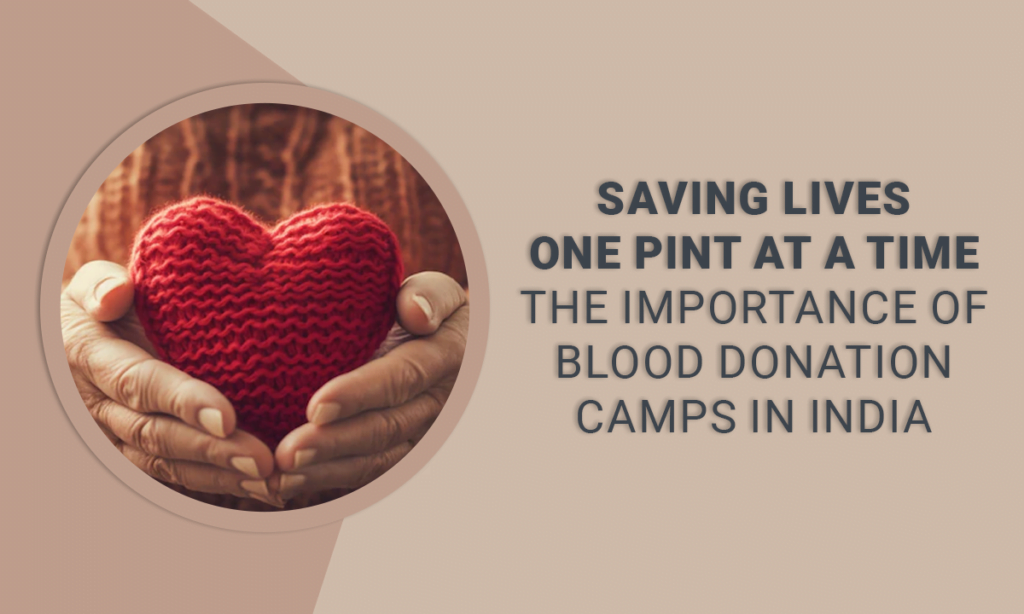In the intricate web of life-saving medical interventions, blood donation emerges as a silent yet potent force. In India, a country that grapples with a vast demand for blood due to its large population and the prevalence of medical conditions requiring transfusions, blood donation camps are not just beneficial; they are essential. This blog post delves into the critical role these camps play in the healthcare system, the challenges faced, and the profound impact of donating blood, one pint at a time.
The Lifesaving Elixir: Understanding Blood Demand in India
India’s healthcare landscape is marked by a stark contrast between burgeoning demand and limited supply, especially when it comes to blood. The World Health Organization (WHO) stipulates that for a healthy and robust blood supply, 1% of the population should be donating. However, India often faces a shortfall. Blood is needed for a variety of medical situations: from routine surgical procedures to complex treatments for cancer, chronic anemia, and road traffic accidents, which are alarmingly high in India.
The need for blood is not only about quantity but also about timely availability. Herein lies the importance of regular blood donation camps, which help maintain an adequate and reliable supply to meet the unpredictable demands of emergency situations.
Mobilizing the Masses: The Role of Blood Donation Camps
Blood donation camps are the backbone of voluntary blood donation in India. These camps are organized by various non-governmental organizations (NGOs), hospitals, colleges, corporate entities, and other organizations, often in collaboration with the Indian Red Cross Society or state blood transfusion councils.
Bridging the Gap Between Need and Supply
These camps play a pivotal role in bridging the gap between the need for and supply of blood. They are strategically located in accessible areas, making it convenient for the public to donate. The camps also serve an educational purpose, raising awareness about the need for regular blood donation and dispelling myths and fears associated with it.
Encouraging Voluntary Blood Donation
A significant challenge in India is the reliance on family/replacement donors. Blood donation camps encourage voluntary donations, which are considered the gold standard in blood safety. Voluntary donors are more likely to be healthy and free from blood-borne infections, thus ensuring a safer blood supply.
Fostering a Culture of Altruism
Blood donation camps are not just about collecting blood; they’re about fostering a culture of altruism and community service. They provide a platform for individuals to engage in a noble cause and save lives, reinforcing the social fabric of community welfare and mutual help.
Overcoming Challenges: The Road to a Sufficient Blood Supply
Despite the critical role of blood donation camps, several challenges impede their success. These include:
Lack of Awareness and Motivation
Many people in India are unaware of the impact their blood donation can have, or they harbor misconceptions about the process. Increasing awareness and educating the public about the safety and health benefits of donating blood can motivate more people to become donors.
Logistical and Regulatory Hurdles
Organizing blood donation camps involves navigating a maze of logistical and regulatory challenges. Ensuring the camps meet the stringent standards for hygiene and safety is paramount. Moreover, there’s a need for better coordination among blood banks to optimize the collection and distribution of blood.
Addressing Seasonal Shortages
Blood donation rates tend to dip during certain times of the year, such as festival seasons or in extreme weather conditions. Campaigns and initiatives must be designed to ensure a steady supply throughout the year, regardless of seasonal variations.
The Ripple Effect of Donating Blood
The act of donating blood has a far-reaching impact that extends beyond the immediate act of saving lives.
Health Benefits for Donors
Blood donation is beneficial not just for recipients but also for donors. It can help in lowering the risk of heart disease and cholesterol levels. The process also includes a health screening, which can be an early indicator of health issues that might require attention.
Community Health and Well-being
A robust blood supply is a key component of a strong healthcare system. Blood donation camps contribute to community health by ensuring that blood is available for surgeries, cancer treatments, chronic illnesses, and emergency responses.
Inspiring Future Generations
Blood donation camps often involve the participation of young adults and professionals, setting an example for future generations about the importance of giving back to society. They serve as educational experiences that can instill lifelong values of community service.
Conclusion: A Call to Action
Blood donation camps in India are more than just temporary setups for blood collection; they are vital cogs in the wheel of healthcare, saving lives and strengthening community bonds. Each pint of blood can save up to three lives, and the act of donating blood is a profound gesture of human solidarity and compassion.
As we reflect on the importance of these camps, it is a call to action for every eligible individual to contribute to this noble cause. It’s a reminder that in the grand scheme of things, the simple act of donating blood is a powerful expression of our shared humanity. So let’s roll up our sleeves and give the gift of life – because when it comes to saving lives, every pint counts.

Pingback: Timely Assistance: The Vital Role of Ambulance Services in India's Healthcare System - Sankalp Bhoomi Trust